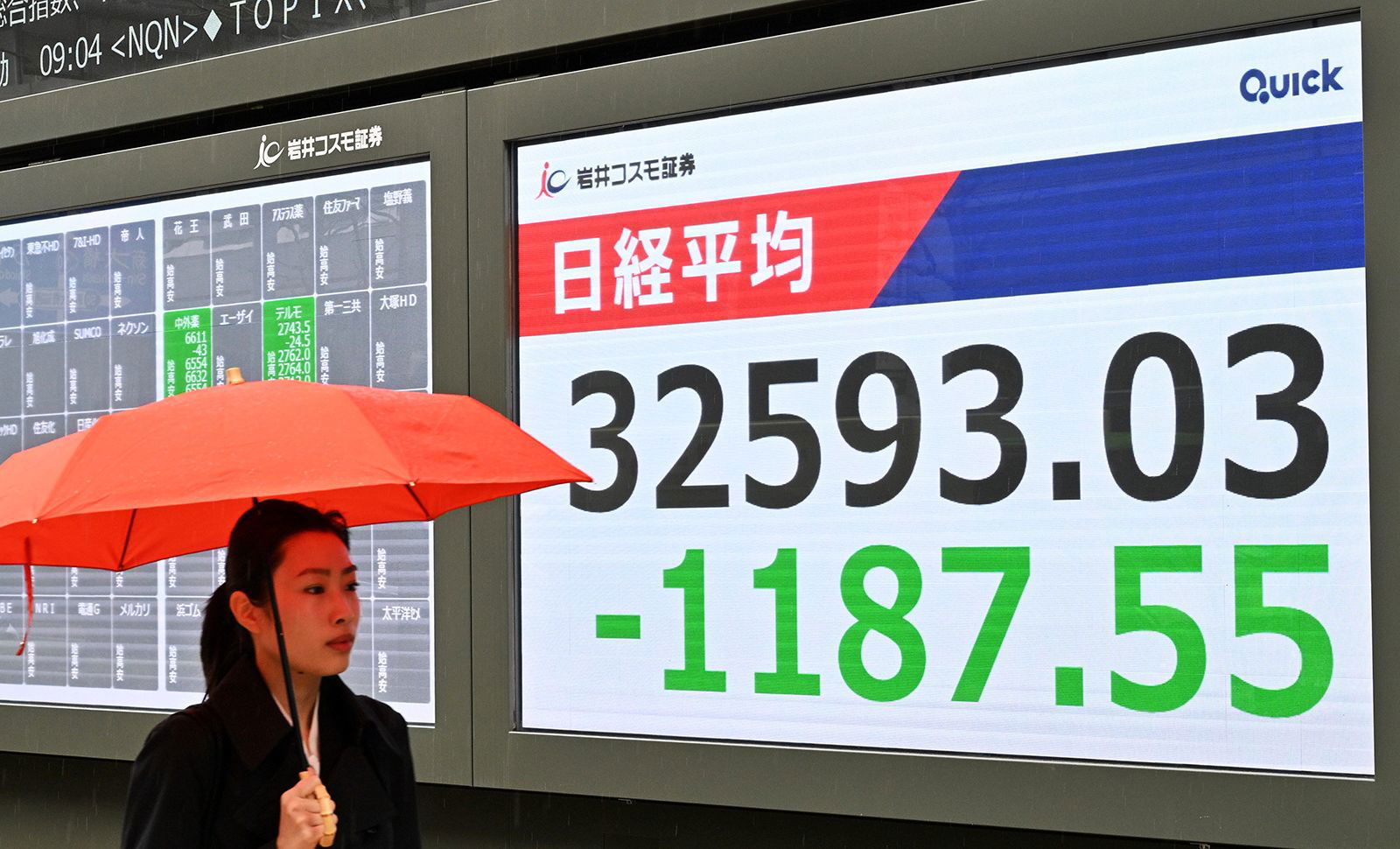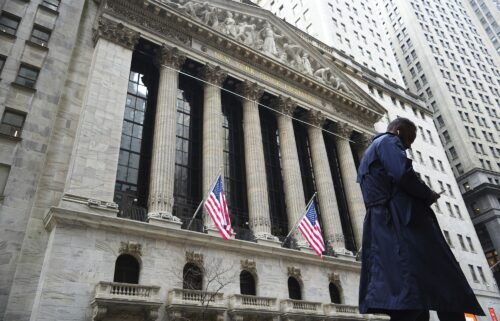Global markets plunge: Trump’s tariff turmoil sends European and Asian stocks into tailspin

A display shows the sharp decline in the Nikkei average stock price in Chuo Ward
By Juliana Liu and John Liu, CNN
Hong Kong (CNN) — Global markets plunged on Monday, deepening a global stocks rout triggered by US President Donald Trump’s trade war and China’s forceful response to unexpectedly high tariffs.
Germany’s Dax opened down 9%, while London’s FTSE was about 5% lower. European markets were, on the whole, faring better than Asian markets in early trade. Japan’s benchmark Nikkei 225 index closed 7.9% lower, while the broader Topix finished down 7.7%. Tech giant Sony plummeted more than 10%.
In Hong Kong, where financial markets reopened after a public holiday, the benchmark Hang Seng index closed more than 13% lower in its worst single trading day since 1997, according to the index’s list of the biggest historic daily losses. In mainland China, the Shanghai Composite Index closed 7.3% lower. The blue-chip CSI300 index also lost about 7%.
“Washington’s shock decision to impose a 34% tariff on Chinese goods dealt a direct blow to core export sectors like semiconductors and EVs (electric vehicles), triggering a sharp and broad-based repricing across Asian markets,” Dilin Wu, a research strategist at Pepperstone, wrote in a research note.
Trading volumes in Hong Kong surged on Monday, which she said was “a clear sign of widespread forced liquidations and what can only be described as a full-blown panic.”
Asian markets are tracking the worst two-day stretch for Wall Street stocks in five years. US stock futures plunged Sunday evening after two sessions of sell-offs that wiped away over $5.4 trillion in market value.
US stocks fell sharply on Friday after China retaliated fiercely, imposing a 34% tariff on all US goods, raising fears of an escalating and damaging trade war fueled by continuing trade tension between the world’s two largest economies.
A commentary published Sunday by the People’s Daily, the ruling Chinese Communist Party’s official mouthpiece, stressed that the country has a “strong capacity to withstand the pressure” in the face of “US tariff bullying.”
“Faced with America’s reckless tariff punches, we know exactly what we’re dealing with, and we have plenty of countermeasures at hand,” it said. “After eight years of trade war with the US, we’ve built up a wealth of experience in this struggle.”
China’s retaliation last week against the latest round of US tariffs was more sweeping than its earlier reciprocal actions and marked a significant escalation in its response, which triggered widespread market turmoil.
Taiwan’s Taiex closed down 9.7% on Monday. Almost all Taiwanese stocks, including TSMC and Foxconn, two of the island’s best-known export powerhouses, triggered circuit breakers, according to Taiwan’s Central News Agency. Both TSMC and Foxconn fell about 10%.
Oil prices continued to slide Monday following last week’s losses. Brent futures, the global benchmark, dropped more than 2.4%, while US West Texas Intermediate crude futures, the US benchmark, declined by 2.5%.
In Australia, the benchmark ASX 200 index closed 4.2% down, while New Zealand’s NZX 50 – the first indices to close in the region on Monday – ended the day 3.7% lower. South Korea’s Kospi finished 5.6% lower. The country’s tech powerhouse and major growth driver Samsung tumbled more than 5%.
Even gold is being sold off. Traditionally considered a safer financial bet, gold has dropped by more than 4% to around $3,030 an ounce since Thursday.
Trump shrugs off concerns
US stocks are set to open sharply lower Monday, putting the S&P 500 on the precipice of a bear market — a decline of 20% from its peak and an ominous sign for investors and perhaps the broader economy.
Bill Ackman, billionaire CEO of investment trust company Pershing Square, said Trump is “losing the confidence of business leaders around the globe” and implored him to call a timeout on Monday to avoid an “economic nuclear war.”
“By placing massive and disproportionate tariffs on our friends and our enemies alike and thereby launching a global economic war against the whole world at once, we are in the process of destroying confidence in our country as a trading partner, as a place to do business, and as a market to invest capital,” he said in a tweet.
On Sunday evening, Trump told reporters aboard Air Force One that he didn’t intentionally crash markets but declined to predict how stocks would trade in the future, which added to investors’ concerns.
“What’s going to happen with the market? I can’t tell you,” Trump said. “But I can tell you, our country has gotten a lot stronger, and eventually it’ll be a country like no other.”
The president, who has long fashioned himself a deal maker, laid out what it would take to get to a deal with China on tariffs. “I’m willing to deal with China, but they have to solve their surplus,” he said. “We have a tremendous deficit problem with China.”
Last year, the US imported $438.9 billion worth of goods from China and exported $143.5 billion to the country, according to the Office of the United States Trade Representative.
The president also said he wants to solve the deficit with the European Union and if they’re open to that, he’s open to discussion. Trump said he had fielded calls on tariffs from technology executives and world leaders over the weekend.
Japanese Prime Minister Shigeru Ishiba said in parliament on Monday that he would continue to appeal to the US to reduce tariffs. On Wednesday, Trump imposed a 24% across-the-board tariff on Japan, a defense treaty ally, which is due to take effect later this week.
Ishiba said he aimed to visit the US “as soon as possible” and wanted to convey the idea that Japan “is not doing anything unfair.”
In Taiwan, President Lai Ching-te said on Sunday that Taipei will negotiate with Washington to eliminate tariffs on both sides and actively resolve its non-tariff trade barriers. He added that Taiwan will purchase more US products to lower the trade deficit, and the island’s defense ministry has put forward a military procurement list.
“We want to make it clear to the US just how much Taiwan contributes to the US economy,” Lai said.
Economists at Barclays said Monday that they take a “cautious view” on the ability of Asian governments such as South Korea and Singapore to successfully negotiate with the US to bring down tariffs and have started the process of trimming economic growth forecasts for the region.
This story has been updated with addtitonal reporting and details.
The-CNN-Wire
™ & © 2025 Cable News Network, Inc., a Warner Bros. Discovery Company. All rights reserved.
CNN’s Junko Ogura, Gawon Bae and Samantha Waldenberg contributed reporting.



